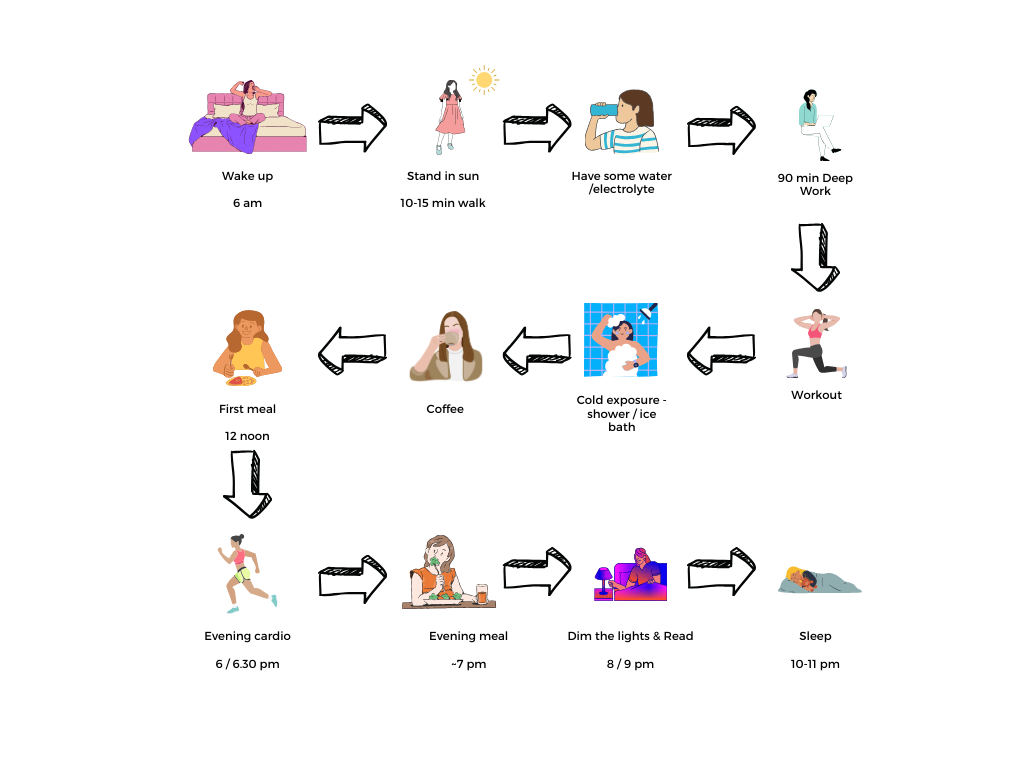A few months back, I went for a regular checkup and figured that I had Vitamin B12 deficiency, my platelet count was low, and I was feeling low and depressed.
This is when I decided to change my lifestyle.
But to do so, I need to build a system, a routine, that works for me.
My research to build a system got me to Dr. Huberman’s daily routine.
Dr. Huberman’s routine is built on the understanding of the body’s biological clock.
While discussing his morning routine (see the video below which explains this beautifully), he mentions that every cell in our body has a circadian rhythm i.e. a 24-hour circadian clock. We work & feel well if all the internal clocks are aligned i.e. all cells in our body understand that it’s time to be awake and it’s time to be asleep.
By following a routine, we can achieve this!
Didn’t I tell you I am looking for a routine to fix my lifestyle!
Before I go into the specifics, here is a cool infographic I created for you to get an understanding of Dr. Huberman’s routine in under a minute.

Who is Dr. Andrew Huberman?
Dr. Andrew Huberman is a neuroscientist. He is 6’2″ (1.88 m) tall and is 48 years old. His birthdate is 26 Sep 1975.
He has a PhD in Neuroscience, from Stanford University.
As a professor at Stanford University, his research is centered around brain development, brain function, cognitive functioning, and other related fields.
He runs the famous Huberman lab podcast is available on Spotify, YouTube, and other platforms.
Huberman daily routine focuses on ensuring that you sleep well at night and are fully functional during the day. The blueprint gives everyone a science-based understanding of all the daily things we do and what is the right way to do it.
Lets understand Andrew Huberman's morning routine
6 – 6.30 AM
Huberman’s preferred time to wake up
Dr. Huberman wakes up at 6 AM and doesn’t use an alarm clock
6 – 6.30 AM
Morning Water hydration
He prefers to take an electrolyte drink which, as he suggests, is good for the nervous system.
He prefers a salt-heavy electrolyte drink called LMNT.
Along with this, Huberman also takes AG1. He has been taking AG1 since 2012.
AG1 by Athletic Greens is a nutrition solution for whole-body health and has 75 high-quality vitamins, minerals, and whole-food sourced ingredients.
6 – 6.30 AM
Yoga Nidra
If not fully rested after a night’s sleep, Huberman does Yoga Nidra.
He has been a believer in NSDR being done anytime during the day whenever you are feeling sleepy.
6.45 AM – 7:00 AM
Talking a walk in the sunlight
As per Dr. Huberman, early morning natural sunlight for 5-10 min.
He suggests, it triggers a cortisol pulse and starts the temperature rhythm. The body gets a wake-up signal when this happens.
In the absence of sunlight, he suggests setting up LED light box as a source.
Workout
Weight train for 45 min training day or alternate day of the week. The workout depends on the day.
Workout helps in clearing out any adenosine left in the system after getting up. Adenosine causes you to feel sleepy.
After the workout, Dr. Huberman may go for some protein drink, oatmeal fruit or so.
Cold Exposure
Cold exposure in the form of a cold shower or ice bath leads to better energy levels, metabolism, physical recovery, and a stronger mind-body connection.
Cold exposure releases dopamine & epinephrine which makes you feel better.
Coffee
Dr. Huberman suggests delaying the coffee intake for 90 min to 2 hours after waking up.
Doing this, in conjunction with a workout & morning walk, ensures that all adenosine is cleared from the system and ensures there is no “crash feeling” after the effect of coffee wears out.
First meal / Lunch
This is his first and the biggest meal of the day. It consists of proteins, vegetables, meat and carbs.
Lets understand Andrew Huberman's evening routine
6.30 PM
Evening Cardio
Dr. Huberman prefers to do some form of cardio in the evening.
7 PM
Dinner time
The dinner is generally 3 hours before the sleeping time. He also tries to have carbohydrate with the meal and avoids heavy food (such as meat) in the meal.
8 – 8.30 PM
Dim Lights
Dimming light helps in getting in the sleep zone before you actually go to sleep. Reducing screen time and blue light exposure helps in better sleep. Blue light disrupts wake-sleep cycle.
10 – 10.30 PM
Sleep time
Sleeping is important for stress relief, trauma release, and emotional stabilizer.
Ensuring sleep time is fixed helps ensure you are fully awake the next morning.
He does take certain supplements such as magnesium-threonate, apigenin, theanine, glycine, and GABA on certain days.
Hope you like the post. Please consult your physician before opting for any supplements.
